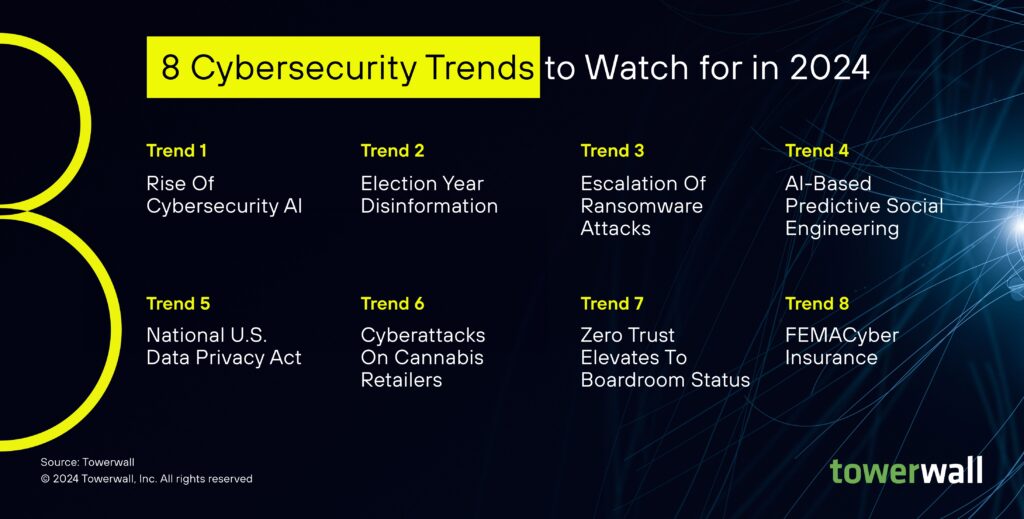Eight Cybersecurity Trends To Watch For 2024
In 2024, for cybersecurity, we’re entering an era where advanced AI tools and intricate social engineering tactics (especially during election years) are changing the game. To avoid potential cyber threats, businesses, governments and individuals must grasp these emerging trends.

Trend 1. Rise Of Cybersecurity AI
In 2024, AI’s role in cybersecurity will expand to encompass automated responses and predictive analytics. It’s about taking preventive measures in advance, using AI to anticipate future cyber threats by analyzing historical data and current trends.
With cyberattacks becoming more sophisticated, AI’s ability to analyze vast datasets and identify patterns will be pivotal. Since AI has become a major part of cyber criminals’ toolkit, AI is expected to become a mainstay in cybersecurity solutions.
Trend 2. Election Year Disinformation
Election years provide fertile ground for social engineering and disinformation campaigns, and there’s no reason to believe 2024 will be an exception. As political tensions rise, so do efforts to manipulate public opinion and undermine democratic processes.
Cybercriminals exploit societal divisions, using sophisticated social engineering tactics to spread misinformation. The FBI also warned of cybercrimes against election officials during the last election cycle.
Americans lost $10.3 billion to online scams in 2022, which also emphasizes the need for ongoing employee security awareness training that includes exercises to help identify social engineering tactics and phishing attempts. The use of open-source intelligence tools (OSINT) to root out network vulnerabilities is recommended as a preventive measure to combat threat actors.
Trend 3. Escalation Of Ransomware Attacks
Ransomware remains a formidable threat in 2024, with tactics becoming increasingly complex and negotiations more aggressive. According to Cybersecurity Ventures, damages from cybercrime are projected to exceed $10.5 trillion globally by 2025.
This alarming escalation calls for robust backup strategies, employee training, cyber insurance, negotiation expertise and incident response plans. Companies can follow the example of external threat hunters by performing tasks such as penetration testing, validating network integrity, identifying unauthorized activity and monitoring for suspicious behavior.
Trend 4. AI-Based Predictive Social Engineering
2024 will likely see a rise in AI-based predictive social engineering and a disturbing convergence of AI and social manipulation techniques.
Leveraging AI, cybercriminals can prey on human weaknesses such as impulsiveness, greed and curiosity to more convincingly create personalized phishing campaigns at scale. AI-facilitated social engineering attacks have been reported to the FTC.
This emerging trend underscores the need to perform AI risk assessments and to consider outsourcing expertise to a virtual AI officer who can step into the role and run AI-resistant security protocols.
Trend 5. National U.S. Data Privacy Act
The progression of data privacy regulations—beginning with the European Union’s General Data Protection Regulation (GDPR) and extending to California’s Consumer Privacy Act (CCPA)—is paving the way for establishing a national data privacy act in the U.S. called the American Data Privacy and Protection Act.
With five states’ privacy acts becoming effective in 2024 and other data breaches costing companies an average of $4.45 million, legislating a national data privacy standard is more urgent than ever.
Trend 6. Cyberattacks On Cannabis Retailers
The burgeoning cannabis industry, particularly retailers, is increasingly vulnerable to cyberattacks as they transition to digital platforms. Banks and credit card services could begin to accept electronic payments and ACH transfers from cannabis businesses—thanks to pending legislation making its way through Congress—and the gap between point of sale (PoS) systems and potential data breaches narrows significantly.
Human error and complacency are major risk factors, and the industry’s nascent adoption of digital technologies makes it an attractive target for cybercrime. Retail dispensaries must prioritize cybersecurity to protect their client data and financial transactions, as the sector’s so-called “green rush” also attracts the unwanted attention of threat actors.
Trend 7. Zero Trust Elevates To Boardroom Status
The concept of zero trust in cybersecurity, akin to the rise of anti-virus software in the 1990s, is set to become a staple topic in boardroom discussions in 2024. Gaining steady momentum, the implementation of zero trust is no longer a technical nicety but a business imperative.
Rooted in the principle of “never trust, always verify,” the widespread adoption of zero-trust architectures signifies a paradigm shift in security strategies, emphasizing continuous verification of every user and device, regardless of their location or network.
This strategic move elevates cybersecurity from a technical concern to a core business function, crucial for protecting organizational assets.
Trend 8. FEMACyber Insurance
To make a bold and unprecedented prediction, FEMA, the federal agency known for last-resort flood insurance, may eventually be called upon to serve as a model and backstop for cyber insurance policies not covered by commercial carriers.
With traditional insurance carriers withdrawing from high-risk regions like Florida due to severe climate events, there is a growing need for federal intervention. A FEMA initiative could potentially underwrite essential services like airports, hospitals, energy and water treatment plants as commercial insurance options become limited.
Conclusion
The increasing complexity of cyber threats underscoring the security trends of 2024 highlights the need for advanced mitigation strategies. Organizations will need to understand these trends, ensure they enable best practices and consider collaborating with outsourced cybersecurity expertise to navigate the security environment and ensure a robust, future-ready cyber defense.
How Towerwall Can Help
Talk to a Towerwall Security Expert
to better protect your organization in 2024 & beyond.
Call 774-204-0700 or email us
This article was originally posted in Forbes Technology Council >


